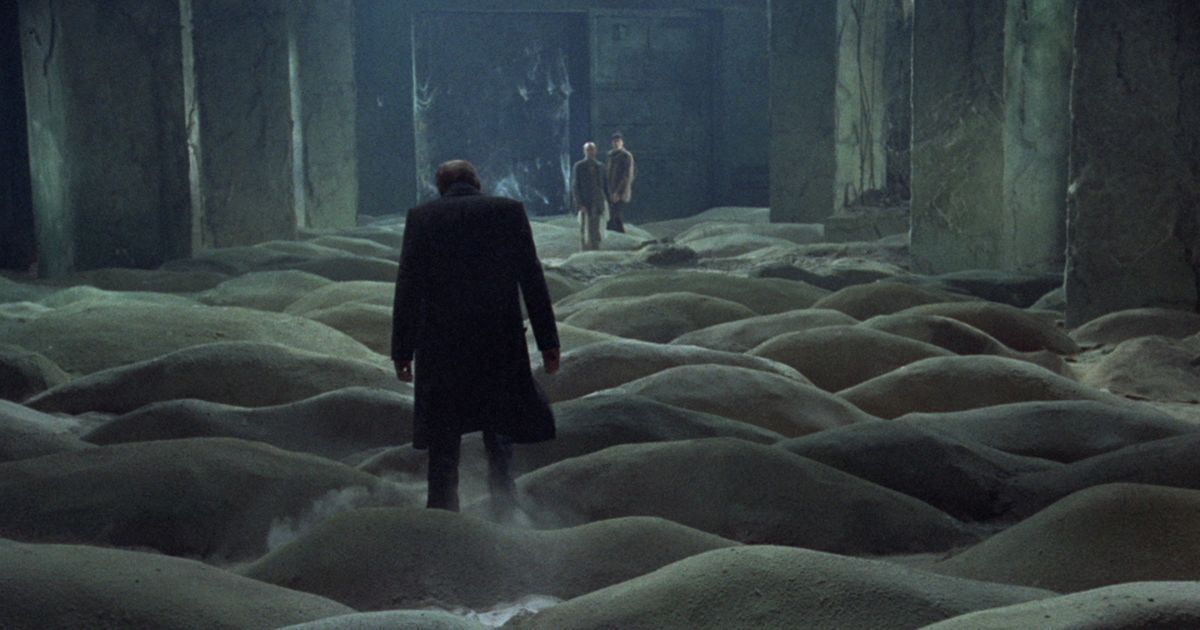
It’s hard to come up with one way to describe Andrei Tarkovsky’s Stalker, let alone define the real meaning behind such a mysterious film.
Is it critical of something specific? Is it an allegory that everyone interprets in their own way (and time)? Or is it perhaps something that Tarkovsky actually tried to convey with his oeuvre that we’re still trying to figure out? In any case, the real question is: does it actually matter what we come up with from a collective perspective? Tarkovsky’s films aren’t easily digestible today, but they speak about your existence much more than you might imagine. His films may feel outdated today, but this doesn’t mean they lack an undeniable importance in regard to an artist’s capacity to speak loudly with a beautiful piece of art.
So, when trying to explain the reason why it’s been listed as number one in Rotten Tomatoes‘ list of the greatest sci-fi films, one must almost live through the actual film. Why? What the film may do to you is entirely different from what it did to millions of viewers, critics or not, throughout the years. It’s not that the Russian filmmaker made personal films that are now your own. It’s that his philosophical dictionary is universally beautiful and efficient when you just open up to the possibility of diving deep into a film and becoming part of a spiritual experience crafted by one man talented enough to do this with ease in his entire body of work.
Tarkovsky’s Unique and Essential Way to Tackle Sci-Fi
If you open up your browser and Google “greatest sci-fi films of all time,” chances are Tarkovsky will show up on every page listed in the results. Either Solaris or Stalker will be there, we can assure you.
Just bear in mind that the director’s manners are drastically different from the ones you would see on those lists. Sci-fi is one of the broadest genres in film and television. It literally gives you infinite reach when designing other worlds, characters, and storylines. There are no limits to what filmmakers can do. As positive as this may sound, this freedom can also damage your vision when going beyond what the limits of your plot demand.
That’s exactly what Tarkovsky does very well. Especially in Stalker, he doesn’t go for a film that follows genre rules and standards. Neither his scripts nor his visuals are typical of what you can find in sci-fi. In Tarkovsky’s universe, philosophy and its offshoots are the basis of a radical study of the human mind and soul, and how characters perform in worlds that aren’t real but can be realistic and a reflection of us all.
In Stalker, two men follow one another. They have been promised a visit to The Zone by a navigator (or ‘stalker’). The Zone is a site that exists only due to legends and stories told by the community of a nation that’s on the verge of self-destruction. A professor and a writer have different agendas that are only revealed in a mind-bending third act that portrays the three men in an impossible place, a room the stalker has taken them to where your desires can come true. The stalker’s realization is proof that this may be his first time in a place where the soul is subjected to an elevated experience. Or perhaps it’s his first time in this version of his existence. We may never know.
There’s nothing traditionally “sci-fi-sh” in Stalker. There are talks of extraterrestrial races and remains, but Tarkovsky doesn’t do this for the audience to indulge in the commercial nature of a genre that tends to be a window to the otherworldly. He decides to stay on Earth and explore more grounded themes such as existentialism, the boundaries of faith and religion, and yes, a social circumstance that’s slightly reminiscent of a very different country.
Why the Critiques of Stalker Don’t Matter
In every review, article, video, or book, you will find something different about Stalker. People will say you’re dumb because you didn’t understand anything the first time, and others will say you’re an idiot because Stalker is literal. Pay no mind to those. Every experience is supposed to be different, and of course, you’re allowed to dislike Tarkovsky’s film. You may like its wonderful and gloomy aesthetic, but if you didn’t get it, that’s fine.
Perhaps a rewatch may result in a different experience. Stalker is one of those films you should watch a few times before trying to decide on what you like about it and what you simply don’t. You’re entitled to that wonderful realization. A self-awareness moment in which you’re able to transform an uncomfortable or pleasurable experience into an opinion about a film that represents different things for anyone who watches it. Just don’t deny the fact that Stalker is an interesting film to watch, an unforgiving exploration into what lies deep inside you.
Chances are you aren’t a film critic. It seems to be a practice heading toward extinction. That 100% score on Rotten Tomatoes was given by critics that had the chance to reflect on their opinion. But it’s just that. An opinion based on personal views that aren’t more important than yours.
If there’s a gift from Tarkovsky that remains valuable today is Stalker, a film that showed that everyone is on the same level of knowledge about its enigmatic existence. No one knows more than the other about what the film is supposed to mean. Critics are beside you when you stare in awe and disbelief at the possibly greatest sci-fi film ever made.
Stalker is available to stream on HBO Max.
















